
Best Heart-Touching Sad Poetry in Urdu to Express Your Feelings
- On
- InSad Poetry
Introduction to Sad Poetry in Urdu
Have you ever felt a heaviness in your heart that words fail to describe? Sad poetry in Urdu has the power to give voice to those unspoken emotions—sorrow, heartbreak, and longing. Urdu poetry doesn’t just capture pain; it transforms it into something profoundly beautiful. This heart touching poetry, with its lyrical elegance, deep resonance, and vivid imagery, serves as a bridge for countless souls to connect, heal, and express their innermost feelings.
If you’ve ever experienced the sting of heartbreak or the quiet despair of life’s challenges, Urdu poetry will echo your emotions, wrapping them in verses that speak directly to your soul.
Historical Significance of Urdu Literature
Urdu literature boasts a rich and diverse history that spans several centuries, deeply influencing the cultural and social fabric of the Indian subcontinent. This literary tradition has been a powerful medium for expressing a wide range of emotions, ideas, and experiences, often serving as a vehicle for social commentary and political activism.
Urdu poetry, in particular, has been a beloved form of literary expression, celebrated for its ability to capture the essence of human emotions. Influenced by Persian, Arabic, and Turkish literary traditions, Urdu poetry has evolved within the unique cultural and social context of the Indian subcontinent. This blend of influences has given Urdu poetry its distinctive lyrical beauty and profound depth.
Throughout history, Urdu literature has played a crucial role in promoting social justice and political activism. Many Urdu poets and writers have used their work to critique social and political injustices, advocating for equality, justice, and freedom. Their poignant verses have not only provided solace to the oppressed but have also inspired movements for social change.
The enduring legacy of Urdu literature lies in its ability to resonate with readers across generations, offering a timeless reflection of the human condition. Its rich tapestry of themes and emotions continues to shape the cultural and social landscape, making it an integral part of the literary heritage of the Indian subcontinent.
Famous Urdu Poets and Their Works
The magic of Urdu sad poetry comes alive through the works of legendary poets who have mastered the art of capturing human emotions.
- Mirza Ghalib: Known for his melancholic ghazals, Ghalib’s poetry delves into the pain of unfulfilled love and existential sorrow.
- Mir Taqi Mir: Revered as the “God of Urdu Poetry,” Mir’s verses are raw, emotional, and deeply moving.
- Faiz Ahmed Faiz: His poetry blends romantic yearning with themes of political struggle, creating a unique and poignant charm.
- Parveen Shakir: A master of expressing heartbreak from a woman’s perspective, her work resonates deeply with readers.
- Ahmed Faraz and Jaun Elia: Their verses cut straight to the heart, exploring themes of love, loss, and despair.
These poets have left behind timeless masterpieces that continue to touch hearts across generations.
Themes and Emotions in Urdu Sad Poetry
Urdu sad poetry resonates so deeply because it speaks to the raw emotions we often bury within ourselves. The use of ‘2 lines’ in Urdu poetry effectively encapsulates these deep feelings, making them poignant expressions of emotions that can be easily shared on social media. Some of the most common themes include:
- Unrequited Love: The agony of loving someone who doesn’t love you back.
- Heartbreak and Separation: Verses that capture the emptiness of losing someone dear.
- Loneliness and Despair: Words that feel like a comforting embrace in moments of solitude.
Urdu poetry explores these themes in ways that are deeply personal yet universally relatable.
Imagery in Heart Touching Sad Poetry
Imagery is a powerful tool in heart touching sad poetry, used to create vivid pictures in the reader’s mind and evoke deep emotions. By painting scenes with words, poets can convey complex feelings and experiences, making their verses resonate on a profound level.
In heart touching sad poetry, imagery often describes the pain and suffering of the poet. It brings to life the emotions of sadness, loss, and longing, allowing readers to empathize and connect with the poet’s experience. For instance, a poet might describe a desolate landscape to mirror their inner turmoil, or use the image of a wilting flower to symbolize fading love.
Imagery also plays a crucial role in creating a sense of atmosphere and mood. Descriptions of the natural world, such as a stormy sea or a barren desert, can reflect the poet’s emotional state, enhancing the overall impact of the poem. This connection between nature and emotion helps to draw readers into the poet’s world, making their feelings more tangible and relatable.
Moreover, imagery can be used to create contrast and juxtaposition in heart touching sad poetry. By describing the beauty of nature alongside the poet’s pain, a sense of irony is created, highlighting the depth of their sorrow. This technique not only emphasizes the poet’s emotions but also adds layers of meaning to the poem, enriching the reader’s experience.
In essence, imagery in heart touching sad poetry serves as a bridge between the poet and the reader, transforming abstract emotions into vivid, relatable experiences. It is through these powerful images that poets can touch the hearts of their readers, leaving a lasting impression that transcends the boundaries of language and culture.
Characteristics of Effective Sad Poetry
The best Urdu sad poetry is marked by its ability to evoke strong emotions. Here are some key characteristics:
- Evocative Language: It uses metaphors, similes, and imagery that etch emotions into your memory.
- Deeply Personal: Each verse is infused with raw, overwhelming feelings, making it relatable to readers.
- Timelessness: The emotions expressed are universal, ensuring the poetry remains relevant across generations.
These qualities make Urdu sad poetry not just an art form but also an emotional experience.
20 Heart-Touching Sad Poetry Lines in Urdu, Roman Urdu, and English
Here are 20 original sad poetry lines in Urdu, Roman Urdu, and English to pierce through your soul and resonate with your emotions:

Urdu: تو جو نہیں تو یہ دنیا ویران لگے
Roman Urdu: Tu jo nahi toh yeh duniya weeraan lage
English: Without you, the world feels deserted.
Urdu: عشق کے خواب کبھی ادھورے نہ ہوتے
Roman Urdu: Ishq ke khwab kabhi adhure na hote
English: Dreams of love would never be incomplete.

Urdu: دل کی زخموں کا ہر کوئی مدوا نہیں
Roman Urdu: Dil ke zakhamon ka har koi madawa nahi
English: Not every wound of the heart can be healed.
Urdu: تیرا فراق ایک طوفان ہے دل میں
Roman Urdu: Tera firaaq aik toofan hai dil mein
English: Your absence stirs a storm in my heart.

Urdu: تیرے بنا یہ زندگی دھواں سی لگے
Roman Urdu: Tere bina yeh zindagi dhuwaan si lage
English: Life feels like smoke without you.
Urdu: میری تنہائی سے زیادہ کچھ بھی گہرا نہیں
Roman Urdu: Meri tanhai se zyada kuch bhi gehra nahi
English: Nothing is deeper than my loneliness.

Urdu: یادوں کے سائے رہتے ہیں ہر وقت ساتھ میرے
Roman Urdu: Yaadon ke saaye rehte hain har waqt saath mere
English: The shadows of memories linger with me always.

Urdu: دھوکہ کیا تو دل سے یقین اُٹھ گیا پھر
Roman Urdu: Dhoka kiya toh dil se yaqeen uth gaya phir
English: Your betrayal stripped my heart of faith.
Urdu: غم کا طوفان دل کے ساحل کو پیس رہا ہے
Roman Urdu: Gham ka toofan dil ke saahil ko pees raha hai
English: A storm of sorrow grinds the shores of my heart.
Urdu: ملی دوستوں سے نقصان محبت کا
Roman Urdu: Mili doston se nuqsaan mohabbat ka
English: I suffered in love, betrayed by friends.
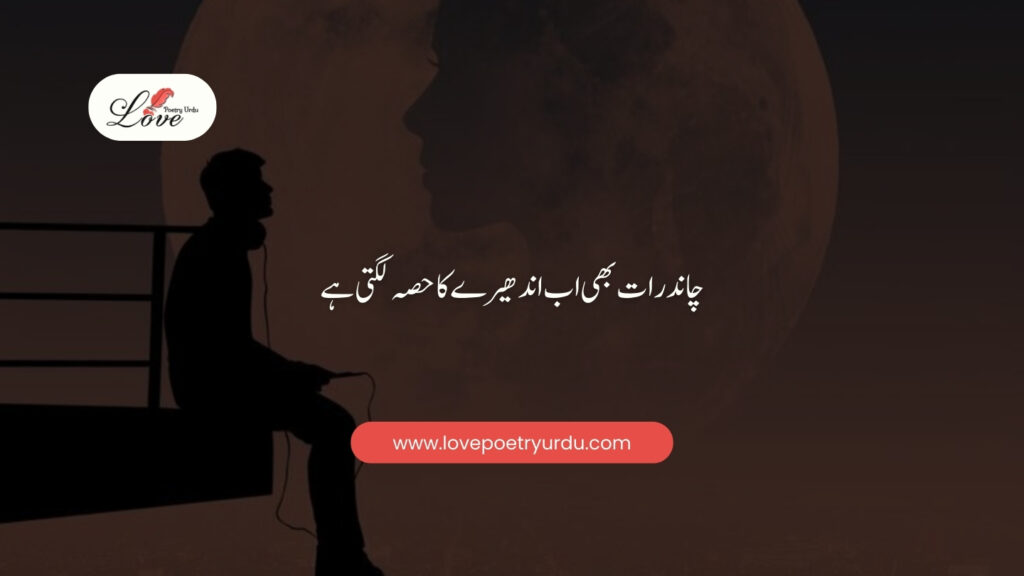
Urdu: چاند رات بھی اب اندھیرے کا حصہ لگتی ہے
Roman Urdu: Chaand raat bhi ab andhere ka hissa lagti hai
English: Even a moonlit night now feels like part of the darkness.
Urdu: تمہاری یادوں نے سنبھال لیا دل کے ٹکڑوں کو
Roman Urdu: Tumhari yaadon ne sambhaal liya dil ke tukron ko
English: Your memories held together the fragments of my heart.
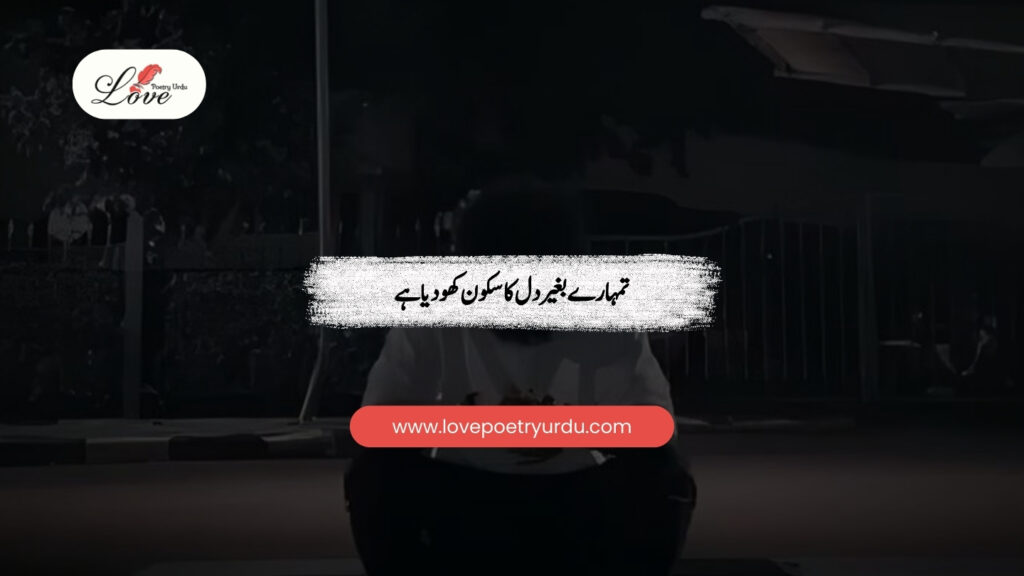
Urdu: تمہارے بغیر دل کا سکون کھو دیا ہے
Roman Urdu: Tumhare bagair dil ka sukoon kho diya hai
English: Without you, I’ve lost the peace of my heart.
Urdu: محبت کی کہانی ادھوری کیوں رہتی ہے؟
Roman Urdu: Mohabbat ki kahani adhoori kyun rehti hai?
English: Why does the story of love always remain incomplete?
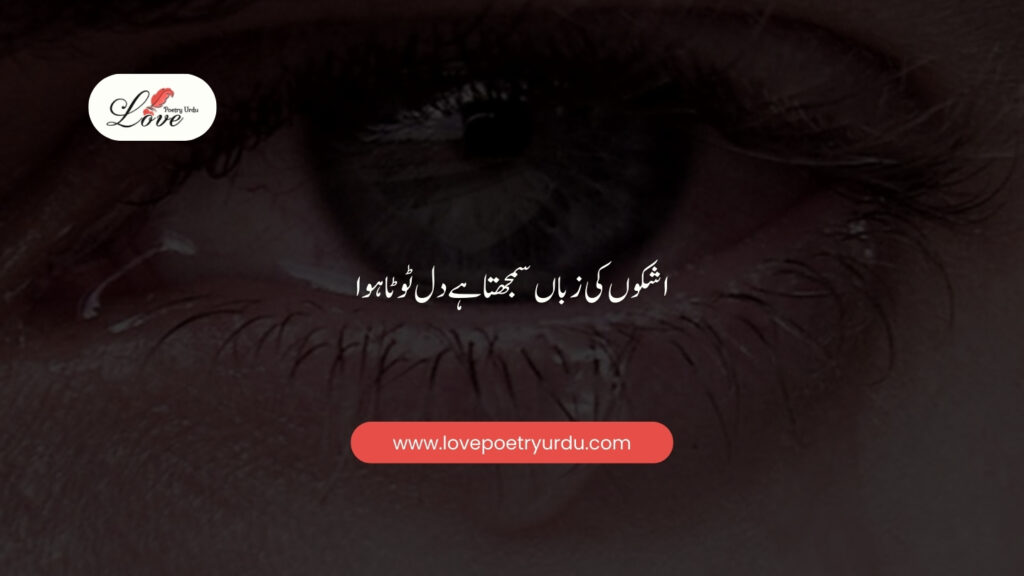
Urdu: اشکوں کی زباں سمجھتا ہے دل ٹوٹا ہوا
Roman Urdu: Ashkon ki zubaan samajhta hai dil toota hua
English: A broken heart understands the language of tears.
Urdu: زندگی کا درد نہ شاعری میں سمٹتا ہے
Roman Urdu: Zindagi ka dard na shairy mein simat’ta hai
English: The pain of life cannot be contained in poetry.

Urdu: تمہاری ہنسی خواب تھی، جو بکھر گئی
Roman Urdu: Tumhari hansi khwab thi, jo bikhar gayi
English: Your laughter was a dream that has now shattered.
Urdu: میرے جذبات کا کوئی گواہ نہیں ملتا
Roman Urdu: Mere jazbaat ka koi gawaah nahi milta
English: No witness can be found for my emotions.
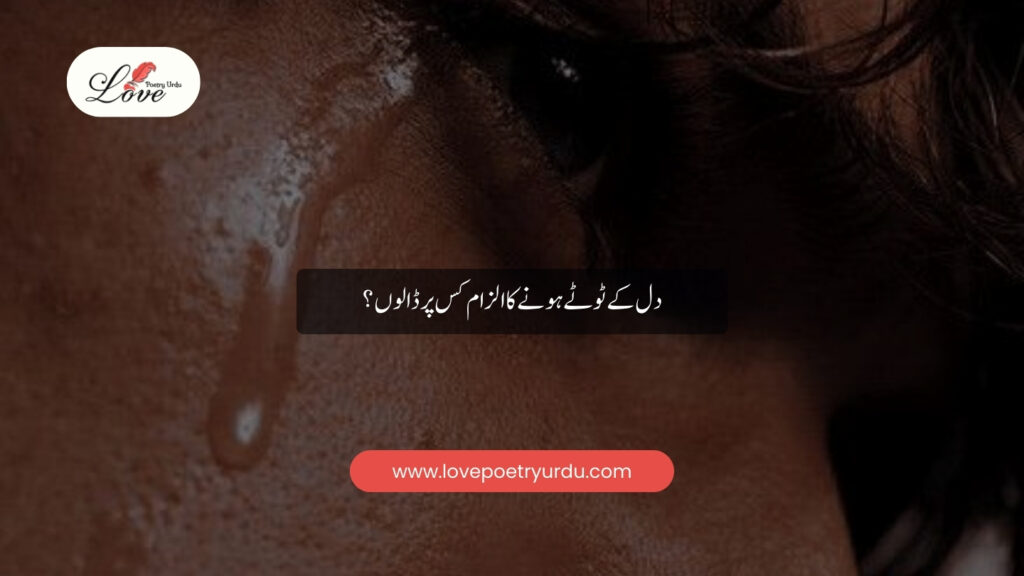
Urdu: دل کے ٹوٹے ہونے کا الزام کس پر ڈالوں؟
Roman Urdu: Dil ke toote hone ka ilzaam kis par daaloon?
English: Who should I blame for my broken heart?
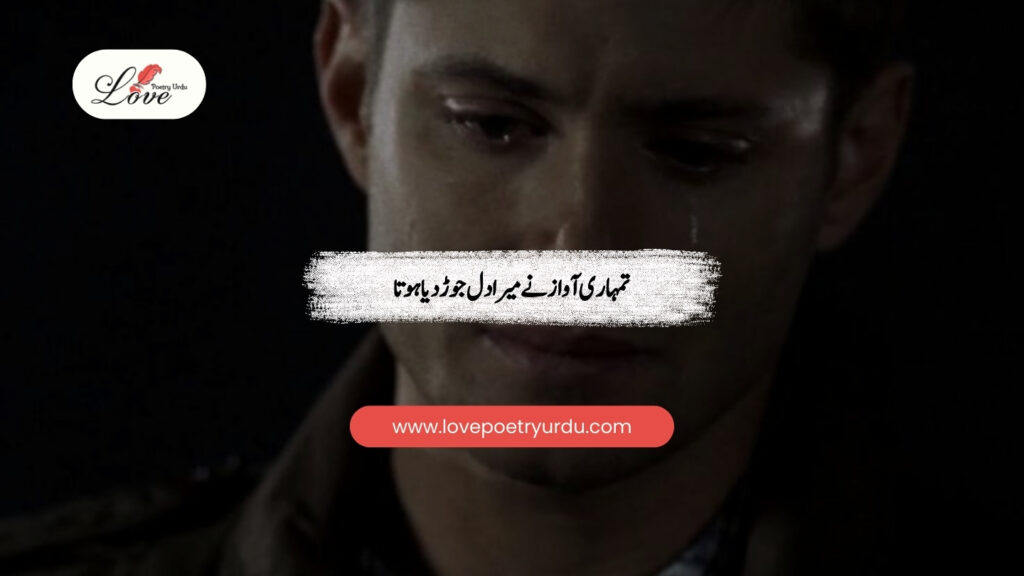
Urdu: تمہاری آواز نے میرا دل جوڑ دیا ہوتا
Roman Urdu: Tumhari awaaz ne mera dil jod diya hota
English: Your voice could have healed my heart.
These lines are perfect for sharing on social media, and the convenience of ‘copy paste’ makes it easier for readers to express their emotions through this beautiful Urdu poetry.
Emotional Healing through Sad Poetry
Sad poetry isn’t just about expressing grief—it’s about healing it. Writing and reading poignant verses can provide a cathartic release, offering solace by reminding you that you’re not alone in your pain. Many poets have processed their heartbreak by penning their emotions, and readers often find comfort in knowing that someone else has felt the same way.
Sad Poetry as an Expression
Whether you’re a poetry lover, someone navigating heartbreak, or simply someone who values the beauty of emotion, Urdu sad poetry will speak to your soul. It’s an invitation to share your feelings, to pour your heart into words, and to find solace in the knowledge that your pain is universal.
What’s your favorite couplet from this collection? Share your thoughts in the comments below!

